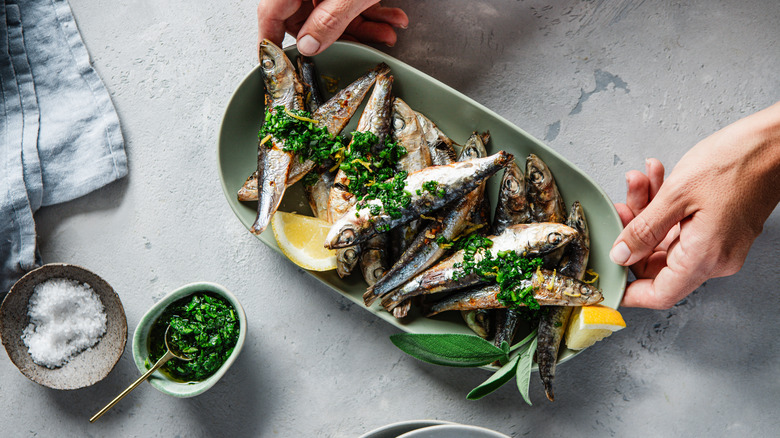Keep Your Bones Strong With This Canned Fish That Has More Calcium Than Milk
Calcium is a vital mineral in the operation of the human body, proving itself to be vital not just for our bones, but also for the heart, nerves, and muscles. For the longest time, milk has reigned supreme when it comes to adding calcium to our diets, but it's actually not the most calcium-rich foodstuff around. Fish are also excellent sources of this mineral, and one in particular blows dairy out of the water.
Canned sardines are an excellent source of calcium, especially for their serving size. Just a 3.75-ounce can of sardines contains 351 milligrams of calcium. In comparison, one cup of milk contains 300 mg. Part of the reason sardines are so rich in calcium is because they're often canned whole, bones and all. If you want to make canned sardines in the air fryer (among other foods), there's no deboning needed, as these are soft and edible, making each little fish a calcium powerhouse.
Of course, the calcium content of a can of sardines can vary based on a few different factors. What liquid they're packaged in is a big one (the most common ones are water, oil, and tomato sauce). Other important factors include the brand and the kind of sardine in question, since not every kind of canned sardines will come with bones. As long as you don't make cooking mistakes that render the canned sardines inedible, they should be a tasty calcium-rich delight that helps keep your bones and teeth strong.
Should you eat sardines for calcium?
The human body can't produce calcium on its own, meaning we can only get it from either the food we eat or from supplements. It's an essential mineral, primarily contributing to our bones and teeth. In fact, an estimated 99% of the calcium found in the human body is in our bones, with just 1% in the blood. If your body isn't taking in enough calcium, it will take what it already has from your skeleton, causing issues like osteoporosis or low blood pressure.
In addition to calcium, sardines are rich in several vitamins and minerals that benefit our bodies, like omega-3 fatty acids. These can help regulate fat and aid the functioning of your eyes and brain. Just like calcium, our bodies can't make omega-3s, and also just like calcium, how much is present in milk and seafood varies. This is where bone-in sardines can help. Eight ounces of 3.25% fat milk has 0.183 grams of omega-3, whereas 100 grams of sardines contains 1.5 to 2.5 grams.
So, should sardines become your new substitute for cow's milk? Well, it's not actually as simple as one food being better than the other, and there are a few potential drawbacks, like high sodium content. Ultimately, each person is unique and has their own dietary requirements, so consider it on a case-by-case basis. Consider consulting a nutritionist that can help you find the best diet for your health and lifestyle, which could very well include sardines.

